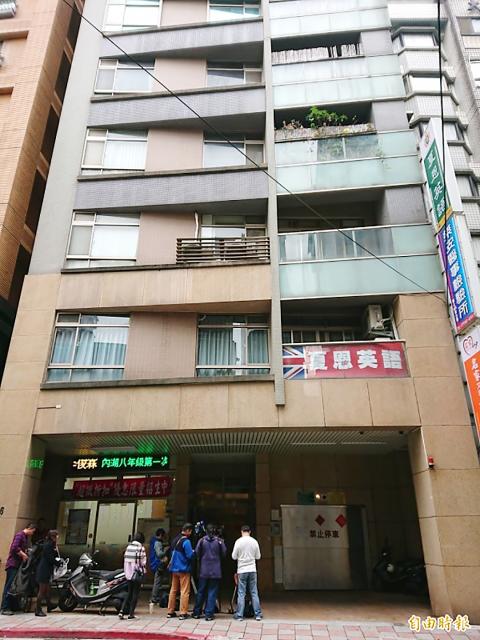The UN Security Council on Friday blacklisted dozens of ships and shipping companies over oil and coal smuggling by North Korea, boosting pressure on Pyongyang as North Korean leader Kim Jong-un plans to meet with his South Korean and US counterparts.
The council’s North Korea sanctions committee acted on a request by the US, designating 21 shipping companies — including five based in China — 15 North Korean ships, 12 non-North Korean ships and Taiwanese Tsang Yung-yuan (張永源).
Tsang is accused of coordinating “North Korean coal exports with a North Korean broker operating in a third country, and he has a history of other sanctions evasion activities,” according to the UN listing.

Photo: Wu Cheng-feng, Taipei Times
He is subjected to an asset freeze and travel ban.
Taiwan-based Pro-Gain Group Corp and Taiwan and Marshall Islands-based Kingly Won International Co, both owned or controlled by Tsang, were also blacklisted.
The move comes days after Kim met Chinese President Xi Jinping (習近平) and an announcement that the North Korean leader would meet South Korean President Moon Jae-in on April 27.
He is also scheduled to meet US President Donald Trump some time next month.
While Trump has agreed to meet Kim, he tweeted on Wednesday that “maximum sanctions and pressure must be maintained.”
Tension over North Korea’s tests of nuclear weapons and ballistic missiles last year surged and raised fears of US military action in response to the North’s threat to develop a nuclear weapon capable of hitting the US mainland.
However, the situation has eased significantly since North Korea in February sent athletes to the Winter Olympics in South Korea.
US Ambassador to the UN Nikki Haley said the UN sanctions designations — the largest agreed by the council’s committee — were aimed at shutting down North Korea’s illegal smuggling activities to obtain oil and sell coal.
“The approval of this historic sanctions package is a clear sign that the international community is united in our efforts to keep up maximum pressure on the North Korean regime,” she said in a statement.
The list was part of a request by Washington late in late February for 33 ships, 27 shipping companies and the Taiwanese man to be sanctioned. China delayed that bid on March 2, but did not give a reason. The 15-member committee works by consensus.
Washington then proposed a shortened list on Thursday, which was unanimously agreed to by the committee on Friday.
The 12 non-North Korea ships are now subjected to a global port ban and must be deregistered, while the 15 North Korean ships are subjected to an asset freeze and 13 of those a global port ban.
The assets of the 21 shipping companies, which include businesses based in the Marshall Islands, Singapore, Panama and Samoa, must be frozen.
The Ministry of Foreign Affairs said the government would continue probing whether other Taiwanese individuals or entities might have helped North Korea.
Taiwan’s ongoing efforts show the government’s determination to follow the sanctions imposed by the international community against North Korea, and to apply diplomatic and economic pressure on Pyongyang, the ministry said, adding that it hopes Taiwan will serve as a role model for other nations.
Additional reporting by CNA

The Ministry of the Interior (MOI) is to tighten rules for candidates running for public office, requiring them to declare that they do not hold a Chinese household registration or passport, and that they possess no other foreign citizenship. The requirement was set out in a draft amendment to the Enforcement Rules of the Public Officials Election and Recall Act (公職人員選舉罷免法 ) released by the ministry on Thursday. Under the proposal, candidates would need to make the declaration when submitting their registration forms, which would be published in the official election bulletin. The move follows the removal of several elected officials who were

The Republic of China (ROC) is celebrating its 114th Double Ten National Day today, featuring military parades and a variety of performances and speeches in front of the Presidential Office in Taipei. The Taiwan Taiko Association opened the celebrations with a 100-drummer performance, including young percussionists. As per tradition, an air force Mirage 2000 fighter jet flew over the Presidential Office as a part of the performance. The Honor Guards of the ROC and its marching band also heralded in a military parade. Students from Taichung's Shin Min High School then followed with a colorful performance using floral imagery to represent Taiwan's alternate name

FOUR DESIGNATED AREAS: Notices were issued for live-fire exercises in waters south and northwest of Penghu, northeast of Keelung and west of Kaohsiung, they said The military is planning three major annual exercises across the army, navy and air force this month, with the navy’s “Hai Chiang” (海強, “Sea Strong”) drills running from today through Thursday, the Ministry of National Defense said yesterday. The Hai Chiang exercise, which is to take place in waters surrounding Taiwan, would feature P-3C Orion maritime patrol aircraft and S-70C anti-submarine helicopters, the ministry said, adding that the drills aim to bolster the nation’s offshore defensive capabilities. China has intensified military and psychological pressure against Taiwan, repeatedly sending warplanes and vessels into areas near the nation’s air defense identification zone and across

A Chinese takeover of Taiwan would severely threaten the national security of the US, Japan, the Philippines and other nations, while global economic losses could reach US$10 trillion, National Security Council Deputy Secretary-General Lin Fei-fan (林飛帆) wrote in an article published yesterday in Foreign Affairs. “The future of Taiwan is not merely a regional concern; it is a test of whether the international order can withstand the pressure of authoritarian expansionism,” Lin wrote in the article titled “Taiwan’s Plan for Peace Through Strength — How Investments in Resilience Can Deter Beijing.” Chinese President Xi Jinping’s (習近平) intent to take Taiwan by force